A Total Inability To Connect
Hope's End: A Powder Mage Short Story
 Writing: 4.6
Writing: 4.6Story/Plot: 4
Depth/Detail: 3
Enjoyment: 4
I love little novellas in worlds I'm already familiar with, and McClellan's are no exception. This is a very quick, bite-sized little tale, following one female soldier, and giving little pieces of main characters from the Powder Mage series. It had what you wanted from a story - exciting battle, some depth and relatability, solid writing, good characters with real dilemmas. It did leave me wanting more out of it, much like Brian's other novella, and it felt just a bit short, even by novella/short story standards. The price was right at $0.99, and I don't mind supporting a cool dude like Brian with my monies.
I guess it's a good thing when you want more of something, right? This was a good little nibble to help hold everyone over until February.
 Writing: 4
Writing: 4Story/Plot: 4
Depth/Detail: 4
Enjoyment: 4
Scalzi continues to confound me. I loved [b:The Old Man's War|239399|The Ghost Brigades (Old Man's War, #2)|John Scalzi|http://d202m5krfqbpi5.cloudfront.net/books/1316729668s/239399.jpg|18279845]. I didn't like [b:Redshirts|13055592|Redshirts|John Scalzi|http://d202m5krfqbpi5.cloudfront.net/books/1348617890s/13055592.jpg|18130445] nearly as much, though it was clever and the ideas were sound. However, [b:The Ghost Brigades|239399|The Ghost Brigades (Old Man's War, #2)|John Scalzi|http://d202m5krfqbpi5.cloudfront.net/books/1316729668s/239399.jpg|18279845] was much closer to [b:Fuzzy Nation|9647532|Fuzzy Nation|John Scalzi|http://d202m5krfqbpi5.cloudfront.net/books/1316132345s/9647532.jpg|18280046] for me. He has this ability to write these books that I enjoy for no real good reason. The characters are all funny and very much human, which is a very appealing skill. The dialogue ranges from hilarious to at least "good", and the stories tend to move along. Yet, all of his books seem to hit a lull, some point in the middle, where I'm going "Man, I'm not sure if this is like, a 3-star book?" Long stretches where the plots seem to sputter, where he seems to meander off sideways.
And then, like in this book, the ending portion just kicks it up a notch, and you leave the book going "yeah, that was pretty awesome". I'm not going to give a big plot analysis or anything, but I'll say I enjoyed a lot of aspects of this book. It integrated past characters without them taking away from the new ones. It presented a very complicated dilemma, a few plot twists, an evil plan with epic consequences. Not the most original plan, albeit, but worked very well in the framework of Scalzi's unique world. This world, frankly, is fascinating, and the history pieces of it, the political elements, the three-dimensional approach, with no real black or white, no "good guys" and "bad guys". This book focused quite a bit on the negative aspects of the Union, pointed out the reasons people would oppose them, the behind-the-scenes manifest destiny style advancement and oppression and war-mongering. A quick nod to the US politics, for sure.
As I mentioned, as always, Scalzi's characters and dialogue are great. It makes up for them perhaps making questionable decisions, or advancing a bit quickly, etc. I always have several moments in his books where I, at the very least, smile - as well as several laugh out loud moments. The humor isn't exactly subtle, but Scalzi uses a deft hand in dishing it out in a way that doesn't take away from the story, doesn't make serious moments seem flat, or distract from the plot. It's a skill and he's got it.
Ghost Brigades isn't my favorite book. It had a decent stretch in the middle where I was on the fence about it. But the ending was very strong, and I would say I overall enjoyed it. It's another one of those books where I can nitpick at it quite a bit, but in the end I was glad to have read it. I'm glad to continue this series, and I really do enjoy reading his novels. While this isn't The Old Man's War, not many books are.
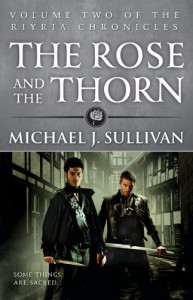 Writing: 4.5
Writing: 4.5Story/Plot: 5
Depth/Detail: 5
Enjoyment: 5
Audio Performance: 5
Mike, Mike, Mike...you've already got me. I already love your books, your characters, your ideas and your fan interaction. I already supported your Kickstarter, bought signed copies of your books on your website, preordered [b:The Crown Tower|16043804|The Crown Tower (The Riyria Chronicles #1)|Michael J. Sullivan|http://d202m5krfqbpi5.cloudfront.net/books/1375570227s/16043804.jpg|21821161] and [b:The Rose and the Thorn|17163514|The Rose and the Thorn (The Riyria Chronicles, #2)|Michael J. Sullivan|http://d202m5krfqbpi5.cloudfront.net/books/1362121827s/17163514.jpg|23589581], along with participating in all surveys, giveaways, promotions, etc. I've got your Hollow World poster framed and hanging in my apartment. I recommend you to others at every turn, pass out your signed bookmarks to my reading buddies as an incentive to buy your stuff.
What I'm trying to get at, is that I'm already a damn fan. You didn't have to go and write a book like The Rose and the Thorn. You didn't need to give me exactly what I want from an MJS book - likable, engaging characters. Plot twists and turns. Subtlety. Humorous dialogue. A variety of points of view and styles. And, above all, a healthy dose of Royce and Hadrian.
In short, The Rose and the Thorn was exactly what I wanted from a Riyria prequel.
It gave me a dose of "behind the scenes" Royce and Hadrian history. It gave a good chunk of Melengar/Medford history, background and groundwork. It introduced the "current" situation in the Revelations fairly fully, and the ending lead up and rolled into it brilliantly. It didn't focus too hard on any one area - there was ample POV from all over the board, from the King, to Vicount Winslow, to Saldur, to Gwen. Introduced Reuben, gave some access to the Pickerings, to the whores of Medford House/The Rose And The Thorn.
But, while providing all of this precious background, Sullivan kept the story lively, the characters active, the drama flowing at a political and personal level. The dialogue was spot on, and had a much more realistic, flowing feel than the early Revelations books had. There is a definite progression in the writing of the Chronicles books as compared to the Chronicles books - in addition to Michael clearly having grown as a writer and word crafter, the writing style of these books leaned a bit more adult. Not in a manner of graphic violence, sex or language, per say - but at the same time, exactly those things. Something as subtle as using the word "whore" more often gave the books a much more realistic feel, especially when it came to bad guys sneering it as an insult. At one point, Royce finally goes full badass. He hatches a scheme, pops a trap and is fully ruthless in revenge. He tortures, humiliates and kills multiple people, and unapologetically at that. It was perhaps the most rewarding and fulfilling piece of Royce writing so far, as it gave a real hard look at just what he was capable of and willing to do in the name of anger and hatred. Michael described the (fairly brutal) torture in a way that got the point across with just enough detail to make you really feel how brutal it was, but without being unnecessarily gory or gratuitous in it's violence.
I could rant on and on about this book - I found it extremely rewarding to read, and while [b:The Crown Tower|16043804|The Crown Tower (The Riyria Chronicles #1)|Michael J. Sullivan|http://d202m5krfqbpi5.cloudfront.net/books/1375570227s/16043804.jpg|21821161] was a great book, The Rose and the Thorn blew it out of the water in my opinion. It stands up to the best of the Revelations books with ease, and feels like a very grown up Riyria. I think it also was a great success as a prequel - as much as I know Michael does not like prequels - because it not only gave the readers of the full series a great history and behind the scenes look, it kept things interesting, gave a full story that was fulfilling and exciting, yet didn't lean too heavily on what happens in the Revelations series, nor did it allow the series to spoil it too much. At this point, I'd almost recommend new readers to pick up the Chronicles books and read them first, do the series in chronological order. The setup for Revelations is perfect leaving this novel, and reading it in order would take away from some of the ("intentional") slowness at the beginning of The Crown Conspiracy, as you'd just be rolling right into the story, instead of working through some of the buildup.
The Rose and the Thorn is an excellent book, and one of the most enjoyable books I've read in 2013. I'm thrilled to see Michael having the success he's having with the series, and I hope these books sell well and continue to encourage him to keep writing, keep giving us Riyria books, and continue to keep his fan involvement and generosity at a high. I plan to recommend these books to anyone I can.
 Writing: 4.5
Writing: 4.5Story/Plot: 4
Depth/Detail: 2.5
Enjoyment: 4.5
I wasn't totally positive what to expect going into Scourge; I've seen reviews pointing both directions, from spectacular to lackluster. What I found was somewhere in between those, but much closer to the spectacular side, in my opinion.
The story is a first person tale, from the POV of Arki, a scribe, who is hired by a band of Syldoon soldiers (a foreign kingdom to his own) to document their doings. He is lead on a brief adventure, following them across country where they're attacked at seemingly every turn, and Arki is forced to defend himself and his employers, adapt to life on the road, and experience gruesome injuries and battles for the first time. We are privileged to travel through his thoughts, his reactions and visuals, his decision making processes, his fears and doubts. It's a rather intimate view, and a skittish scribe is a great viewpoint for a group of hardened soldiers and their exploits.
The story leads from a small inn (where they encounter trouble), to their travels (where they encounter trouble), to the big city they were destined to (where they encounter trouble), and finally through a plot to trick two sides (the church and the barony) to turn on each other, causing discord in the region for the purpose of furthering the Syldoon stance and prevent the king in the region to rise to power, which would be unbenficial to the Syldoon. This plan, of course, turns on them and leads to, you guessed it, trouble. There is a brief amount of magic, mostly revolving around the Syldoon general's weapon, which he is bound to, predicts violence, and causes physical terrors to the general for every life he takes with it.
The brief use of the magic is a theme for the book - brief. The world is not explained much. The scope of the story is very small, a very small area, very small group of people. Very small magic scope. Very small character development scope. The book is short, down and dirty, quick to points. Which in itself is not a bad thing. It leads to a lack of immersion for me (and I assume some people), the type of person who likes to get involved in the world, enjoy the history, the magic, the politics. Scourge skips this in favor of focusing on personalities, on character drama, on intimate battles and internal thought processes. And honestly, it's kind of refreshing. The disappointment in the lack of depth is that I WANTED that depth, because that tip of the iceberg that is given to the readers is fascinating. I want to know more about the kingdom, the politics, the Syldoon relationship with Arki's kingdom, the magic, the races and class system and merchant trains and the Godveil and all the other things that are alluded to, mentioned, featured or shown, but in a limited capacity. I WANT more. Salyards is such a tease, omigosh.
The writing itself is pretty splendid. The dialogue is visceral, real, to the point, and is used very well. The characters are distinctive in their speech patterns, use of words, tone, style. The battles are exciting, well written, very gritty and realistic and gruesome, without being overly gory. The gore is there, it's described well and in detail, but not gratuitous. Not overdone. It was handled expertly, in my opinion. Arki's internal (and external) reactions are great, totally relatable if you're someone like me who is not a strong-stomached folk and don't handle gore well. There were a few spots that made me scratch my head a bit. One such situation was a fairly cringeworthy spot near the beginning, where sex is occurring in Arki's room, and he's laying in the dark thinking about his arousal and how he'd like to touch himself. Maybe realistic, but extremely awkward to put into the book.
In the end, I truly enjoyed this book. It started a bit on the slow side, but it picked up quickly, and was a rollercoaster emotional ride through to the finish. The world that is hinted at in the book is intriguing, and I want to know more, experience more in this world, these characters, their quest to complete their mission. I want to know more about why Arki was required to come along with the Syldoon, what politics in their world caused the mission, the scribe, the deceipt. So many questions left unanswered that I'd love to see completed in future books.
 Writing: 5
Writing: 5Story/Plot: 4
Depth/Detail: 3
Enjoyment: 4
Audio Performance: 5
I've been fairly outspoken about my relative distaste for Gaiman's writing, as well as the hype surrounding it. I found [b:American Gods|4407|American Gods|Neil Gaiman|http://d202m5krfqbpi5.cloudfront.net/books/1258417001s/4407.jpg|1970226] to be one of the more lacklustre books I've ever read, and [b:Stardust|16793|Stardust|Neil Gaiman|http://d202m5krfqbpi5.cloudfront.net/books/1328433738s/16793.jpg|3166179] to be completely disappointing and disjointed. Despite that, I get hounded relentlessly from Gaimanites about how great he is, how amazing his books are, how incredible his prose is, etc. I keep giving him chance after chance it feels like, reading his books and just not getting it. I get insulted for being unintelligent, for being a casual reader, for not being analytic, for understanding the genius, for seeing the brilliance in meandering books with no real point and seemingly arbitrary insertion of magic.
Well, I sort of get it after [b:Ocean At The End Of The Lane|15783514|The Ocean at the End of the Lane|Neil Gaiman|http://d202m5krfqbpi5.cloudfront.net/books/1351914778s/15783514.jpg|21500681]. Kind of. I found the book to be lighthearted and whimsical, like his books tend to be. I found the plot to be pointless and meandering, seemingly arbitrary, entirely about the writing and less about the actual happenings. All of the things that I tend to dislike about Gaiman's novels. That said, I found something about this book to be different. The prose was beautiful, as people say. The characters were real, visceral, human, with human emotions and growth and dialogue. The prose was flowing, pretty, flowery. The book was 190 pages of fluff, but it was fluff that worked. It was not infuriating, as his other books might be, but it felt right, it felt like it all made sense in the framework of the story.
The story might have been random, spacy, arbitrary. The plot movement may have hovered near the nonexistent, but it was still just so enjoyable. I still had qualms with it, as I think I will with any and all of his work. Maybe it's true that I just "don't get it", that I'm not smart enough, that I don't appreciate subtlety enough, that I just don't understand his genius.
But for once, I kind of see it.
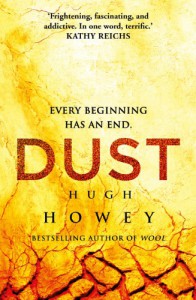 Writing: 4.5
Writing: 4.5Story/Plot: 4.5
Depth/Detail: 4.5
Enjoyment: 4.5
Simply put, this is one of my favorite series of all time. One of the few that completely lived up to the hype for me - the writing is great, the characters are great, the world is great, the drama is great. I don't feel the need to write a 5000 word essay on why I love this series. Dust is a fitting ending, ties up a lot of the loose ends that remained, introduced some new characters and finished up what was started a couple years ago. I couldn't recommend this series any harder. Please read it.
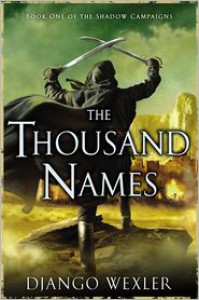 Writing: 4.5
Writing: 4.5Story/Plot: 4.5
Depth/Detail: 4
Enjoyment: 4.5
Audio: 4.5 (very good)
r/Fantasy Goodreads Group September Book Of The Month.
I had planned on reading this novel before it was chosen as our BOTM, but that just gave me an extra excuse. It was another book like Brian McClellan's [b:Promise Of Blood|15790883|Promise of Blood (The Powder Mage, #1)|Brian McClellan|http://d202m5krfqbpi5.cloudfront.net/books/1350337505s/15790883.jpg|21512438] that the pre-hype got me excited for a new release from a new author, and the story sounded riveting. What I expected? I'm not sure - some battles, a lot of guns and shooting and some magic maybe. What did I get? A really gritty, military-centric romp with only subtle magic use until the ending when it became the focal point. In that way, it almost felt like two novels - a chronicling of a long military campaign juxtaposed with a tale of magical deceit and drama and a military Colonel with ulterior magical motives.
The book follows a handful of very interesting characters, the main being Winters, a female masquerading as a male soldier, who through a series of strange turns ends up as a lieutenant, tasked with leading a group of soldiers while fighting to keep her sex a secret. The other was Marcus, a captain who was sent to what normally amounted to a purgatory-type assignment, but one that turned quite interesting when a rebellion began, and Marcus and Winters found themselves in the midst of an epic battle. Winters fairly early on ends up saving a girl from the opposing side, one that turns out to be of the magical equation and ends up essentially turncoating to Winters' side by some weird mix of debt and Stockholm Syndrome (that was a joke).
Through the eyes of Winter and Marcus, we meet a wide array of characters, from a traitorous lover, to Colonel Janus bet Vhalnich, a highly regarded leader who it turns out has a nearly insatiable desire to recover religious artifacts and relics from the enemy. Through this, the troops find themselves in the middle of a battle that seems quite difficult to win, and only some luck and magical intervention from an unlikely source get them out of it. The book ends on a mighty cliffhanger leading into the next book of the series, which bothers some people a lot more than it bothered me - I like some suspense at the end of books. It's revealed that there's a lot more going on than just a small-scale military situation in a remote location, that there is a lot of depth to this world that has yet to be revealed, things of a more political leaning.
I enjoyed the nitty-gritty of the military day to day life. Wexler captures a very realistic feeling military camp setting, down to the card games, bullies starting fights in camp, and the arguments amongst leadership. There's jealousy, deceit, misdirection; all things to add depth to a relatively small time and geographical picture. The characters feel real; they make logical decisions in general, the dialogue feels like it is indicative of things that would actually be said, rather than a means to an end, choice wording for the purpose of plot movement, or just an empty vessel to roll the story forward. I found the interactions between characters to be fun and flowing, the drama between them visceral and relatable.
I've read some reviews where people were put off by the hard military feel of the story, but it was appealing to me. What I expected to be a mildly military fantasy with some guns turned into a crazy hybrid of [b:The Black Company|140671|The Black Company (The Chronicle of the Black Company, #1)|Glen Cook|http://d202m5krfqbpi5.cloudfront.net/books/1379150549s/140671.jpg|390334], [b:Promise of Blood|15790883|Promise of Blood (The Powder Mage, #1)|Brian McClellan|http://d202m5krfqbpi5.cloudfront.net/books/1350337505s/15790883.jpg|21512438] and something like [b:The Lions of al-Rassan|104101|The Lions of al-Rassan|Guy Gavriel Kay|http://d202m5krfqbpi5.cloudfront.net/books/1348007861s/104101.jpg|955081]. Military camp, guns, magic, politics, twists, turns, layers. I'll admit that the writing isn't perfect - there are times it felt a bit clumsy, times the plot came to a bit of a halt, and more than once a situation came up where the situation seemed impossible to get out of, and a seemingly arbitrary event occurred that bailed everyone out with seemingly serious injuries that they of course recovered completely from. These were a bit few and far between, so it's not a full complaint.
In the end, I really enjoyed this debut. While it's got aspects of a lot of other books, I'm yet to read a book that has quite this combination of settings, characters and military action. The magic system is yet to really be explored in depth, in my opinion, and was largely glossed over or just hinted at for the majority of the book, before coming a focal point when the military aspects were put on the back burner. I'm interested to see where Wexler takes the series going forward, what kind of politics come into play, what future military ventures they fit into things as this seems to be his forte. Either way, this is a successful debut, well-written and engaging, and a firm statement that Django is here and will be a strong player in the fantasy genre.
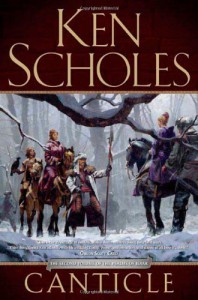 Writing: 4.5
Writing: 4.5Story/Plot: 5
Depth/Detail: 5
Enjoyment: 4.5
Why more people have not been reading and talking about this series is absolutely beyond me. I read Ken Scholes' [b:Lamentation|3531469|Lamentation (Psalms of Isaak, #1)|Ken Scholes|http://d202m5krfqbpi5.cloudfront.net/books/1312029311s/3531469.jpg|3573263] based upon the fact he's a local author, seemed like an upstanding fellow, and based on the personal recommendation of a friend who is associated with Ken's writing. I couldn't possibly have been happier with the result - Lamentation was a triumph, a truly unique, well written and engrossing tale, a hybrid fantasy with intelligent robots, magic, warfare, drama, romance, and some of the more intriguing characters I've read in any book.
[b:Canticle|164154|A Canticle for Leibowitz|Walter M. Miller Jr.|http://d202m5krfqbpi5.cloudfront.net/books/1329408540s/164154.jpg|250975] picked up right where Lamentation left me, up to my neck in deep character drama, a world torn apart by conflict, moral and tactical decisions and dilemmas abound. The book starts with an absolute bang, going from a quick intro right into an atom bomb of an event, one that shaped the rest of the book, and one that laid the groundwork for the unraveling of events through the rest of the book. Some of the events in this book are much heavier than in Lamentation, much darker, much more dramatic. There's more than one heart-stopping moment, eloquently described and with sufficient drama to really put you in the moment. I've come to like these characters, feel for them, understand them, and even the ones with questionable morals or intentions are well enough explained that you respect and understand them, and feel for their dilemmas and losses.
Luckily, even more of the world's lore is unraveled during this book, much more about the Andofrancines and their libraries, their mechoservitor robots, the drama of Whym and Y'Zir, the building of Sanctorum Lux (which leads to a pretty dramatic few pages towards the end). One of the main characters, Jin Li Tam, is perhaps one of the most torn - stuck between loyalty to her family that is ingrained deep within her, but struggling with her family's betrayal of her, using her for political gain and to push their agenda. She's got her baby with Rudolfo, the man she's come to love, and must balance protecting her newborn and sickly son, finding a way to cure what ails him (that came partially at her own doing), and to do her duty as the new wife and queen of a kingdom and army. Rudolfo is met with much of the same, the need to find the cure for his only child and heir, while pulled morally in different directions, and forced to choose between what might benefit the world as a whole, and what he truly desires for himself and his family.
We also see much more of Neb, Winteria and the role she plays with the Marshfolk, Isaak the mechoservitor as well as some more of his kin, and even Charles, the creator/builder of the mechoservitors. There are layers and layers of drama and history here, each move bringing more layers and complications, each making the world deeper and more interesting. The ending feels both a bit less "solid" than the first book, and goes on a few pages too long - it kind of slowly fizzles out, ties up some loose ends but still leaves a ton open. The events of the book were so dramatic and captivating, that the ending felt a bit sluggish and underwhelming. It left me desperately wanting to begin reading [b:Antiphon|7979699|Antiphon (Psalms of Isaak, #3)|Ken Scholes|http://d202m5krfqbpi5.cloudfront.net/books/1316727570s/7979699.jpg|12361043], but it also left me a bit disappointed. I can't really complain about it too much - every book will have it's slow points, it just sticks with you more when it's right at the end.
The writing, as with before, is very approachable, makes characters and dialogue feel real and natural and never forced, people make what seem like appropriate choices and actions. The book's not perfect, nor is the writing, but it's flaws appear in a more endearing way, rather than an annoying one (although, after the fifth time someone was spacing out mid-conversation before 'realizing that xxxx was speaking' and going 'huh, sorry what?'...). There is still obvious growth between the first book and this, and I continue to hear it just gets better and better as the series progresses. Which I will soon find out, as I simply cannot get enough of this world, of it's people and it's history, and I can't get enough of Mr. Scholes' wordcrafting and worldbuilding.
Beers of the World
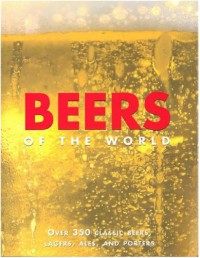 A picture book of major breweries, skipping a lot of smaller ones. Also was made before a lot of the new, popular and/or upstart breweries were relevant or established. Still fun coffee-table read, especially for more casual beer drinkers.
A picture book of major breweries, skipping a lot of smaller ones. Also was made before a lot of the new, popular and/or upstart breweries were relevant or established. Still fun coffee-table read, especially for more casual beer drinkers.
Craft of Stone Brewing Co., The: Liquid Lore, Epic Recipes, and Unabashed Arrogance
 A big beautiful book full of pictures and anecdotal stories. Clever, funny at times, and slightly informative - not particularly big on depth, but a nice coffee-table book if you have beer loving friends.
A big beautiful book full of pictures and anecdotal stories. Clever, funny at times, and slightly informative - not particularly big on depth, but a nice coffee-table book if you have beer loving friends.
Home Brewer's Answer Book: Solutions to Every Problem, Answers to Every Question
 A bit more spartan of a guide than many of the other similar books. Is a smaller, more pocket-friendly size, however.
A bit more spartan of a guide than many of the other similar books. Is a smaller, more pocket-friendly size, however.
Brewing with Wheat: The 'Wit' and 'Weizen' of World Wheat Beer Styles
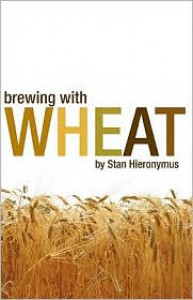 A good, albeit fairly entry-level look at brewing wheat beers. The recipes are quite simple and basic, but it's a reference book, not a recipe book. The technical aspects are good and helped me out with my wheat brewing.
A good, albeit fairly entry-level look at brewing wheat beers. The recipes are quite simple and basic, but it's a reference book, not a recipe book. The technical aspects are good and helped me out with my wheat brewing.
 A much more technical and informative reference book, tons of recipes and tips that helped me with designing my own beer recipes in my early days of brewing.
A much more technical and informative reference book, tons of recipes and tips that helped me with designing my own beer recipes in my early days of brewing.
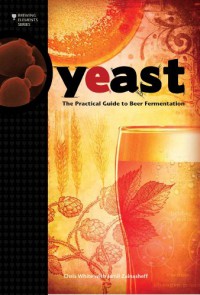 An interesting semi-technical reference book. Dense and a bit difficult to follow, even at a semi-advanced brewing level, but at the same time not the most informative. Still a good reference.
An interesting semi-technical reference book. Dense and a bit difficult to follow, even at a semi-advanced brewing level, but at the same time not the most informative. Still a good reference.
 Nowhere near as good as [b:How To Brew|157265|How to Brew Everything You Need to Know to Brew Beer Right the First Time|John J. Palmer|http://d202m5krfqbpi5.cloudfront.net/books/1347634528s/157265.jpg|151769], but still a nice resource with quality photographs and approachable writing.
Nowhere near as good as [b:How To Brew|157265|How to Brew Everything You Need to Know to Brew Beer Right the First Time|John J. Palmer|http://d202m5krfqbpi5.cloudfront.net/books/1347634528s/157265.jpg|151769], but still a nice resource with quality photographs and approachable writing.



